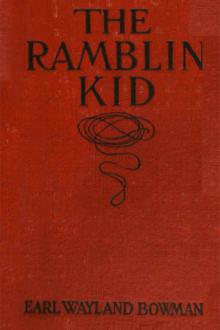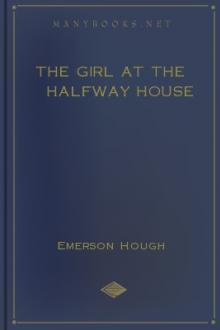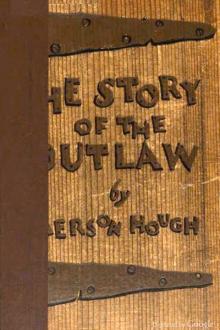The Cross-Cut, Courtney Ryley Cooper [best ereader for manga txt] 📗

- Author: Courtney Ryley Cooper
Book online «The Cross-Cut, Courtney Ryley Cooper [best ereader for manga txt] 📗». Author Courtney Ryley Cooper
"Harry."
"Aye."
"I 'm going after the other side. We 've been playing a half-horsed game here."
"I 've been thinking that, Boy."
"Then I 'm going to tackle the foot wall. You stay where you are, for a few more shots; it can't do much good, the way things are going, and it can't do much harm. I was at the bank to-day."
"Yeh."
"My balance is just two hundred."
"Counting what we borrowed from Mother 'Oward?"
"Yes."
Harry clawed at his mustache. His nose, already red from the pressure of blood, turned purplish.
"We 're nearing the end, Boy. Tackle the foot wall."
They said no more. Fairchild withdrew his drill from the "swimmer" or straightforward powder hole and turned far to the other side of the chamber, where the sloping foot wall showed for a few feet before it dived under the muck and refuse. There, gad in hand, he pecked about the surface, seeking a spot where the rock had splintered, thereby affording a softer entrance for the biting surface of the drill. Spot after spot he prospected, suddenly to stop and bend forward. At last came an exclamation, surprised, wondering:
"Harry!"
"Yeh."
"Come here."
The Cornishman left his work and walked to Fairchild's side. The younger man pointed.
"Do you ever fill up drill holes with cement?" he asked.
"Not as I know of. Why?"
"There 's one." Fairchild raised his gad and chipped away the softer surface of the rock, leaving a tubular protuberance of cement extending. Harry stared.
"What the bloody 'ell?" he conjectured. "D' you suppose—" Then, with a sudden resolution: "Drill there! Gad a 'ole off to one side a bit and drill there. It seems to me Sissie Larsen put a 'ole there or something—I can't remember. But drill. It can't do any 'arm."
The gad chipped away the rock. Soon the drill was biting into the surface of the foot wall. Quitting time came; the drill was in two feet, and in the morning, Fairchild went at his task again. Harry watched him over a shoulder.
"If it don't bring out anything in six feet—it ain't there," he announced. Fairchild found the humor to smile.
"You 're almost as cheerful as I am." Noon came and they stopped for lunch. Fairchild finished the remark begun hours before. "I 'm in four feet now—and all I get is rock."
"Sure now?"
"Look."
They went to the foot wall and with a scraper brought out some of the muggy mass caused by the pouring of water into the "down-hole" to make the sittings capable of removal. Harry rubbed it with a thumb and forefinger.
"That's all," he announced, as he went back to his dinner pail. Together, silently, they finished their luncheon. Once more Fairchild took up his work, dully, almost lackadaisically, pounding away at the long, six-foot drill with strokes that had behind them only muscles, not the intense driving power of hope. A foot he progressed into the foot wall and changed drills. Three inches more. Then—
"Harry!"
"What's 'appened?" The tone of Fairchild's voice had caused the Cornishman to lean from his staging and run to Fairchild's side. That person had cupped his hand and was holding it beneath the drill hole, while into it he was pulling the muck with the scraper and staring at it.
"This stuff's changed color!" he exclaimed. "It looks like—"
"Let me see!" The older man took a portion of the blackish, gritty mass and held it close to his carbide. "It looks like something—it looks like something!" His voice was high, excited. "I 'll finish the 'ole and jam enough dynamite in there to tear the insides out of it. I 'll give 'er 'ell. But in the meantime, you take that down to the assayer!"
CHAPTER XIX
Fairchild did not hesitate. Scraping the watery conglomeration into a tobacco can, he threw on his coat and ran for the shaft. Then he pulled himself up, singing, and dived into the fresh-made drifts of a new storm as he started toward town; nor did he stop to investigate the fast fading footprints of some one who evidently had passed the mine a short time before. Fairchild was too happy to notice such things just now; in a tin can in his side pocket was a blackish, muggy mixture which might mean worlds to him; he was hurrying to receive the verdict, which could come only from the retorts and tests of one man, the assayer.
Into town and through it to the scrambling buildings of the Sampler, where the main products of the mines of Ohadi found their way before going to the smelter. There he swung wide the door and turned to the little room on the left, the sanctum of a white-haired, almost tottering old man who wandered about among his test tubes and "buttons" as he figured out the various weights and values of the ores as the samples were brought to him from the dirty, dusty, bin-filled rooms of the Sampler proper. A queer light came into the old fellow's eyes as he looked into those of Robert Fairchild.
"Don't get 'em too high!" he admonished.
Fairchild stared.
"What?"
"Hopes. I 've seen many a fellow come in just like you. I 've been here thirty year. They call me Old Undertaker Chastine!"
Fairchild laughed.
"But I'm hoping—"
"Yep, Son." Undertaker Chastine looked over his glasses. "You 're just like all the rest. You 're hoping. That's what they all do; they come in here with their eyes blazing like a grate fire and their faces all lighted up as bright as an Italian cathedral. And they tell me they 've got the world by the tail. Then I take their specimens and I put 'em over the hurdles,—and half the time they go out wishing there was n't any such person in the world as an assayer. Boy," and he pursed his lips, "I 've buried more fortunes than you could shake a stick at. I 've seen men come in here millionaires and go out paupers—just because I 've had to tell 'em the truth. And I 'm soft-hearted. I would n't kill a flea—not even if it was eatin' up the best bird dog that ever set a pa'tridge. And just because o' that, I 've adopted the system of taking all hope out of a fellow right in the beginning. Then if you 've really got something, it's a joyful surprise. If you ain't, the disappointment don't hurt so much. So trot 'er out and let the old Undertaker have a look at 'er. But I 'm telling you right at the start that it won't amount to much."
Sobered now, Fairchild reached for his tobacco can, which had been stuffed full of every scrap of slime that he and 'Arry had been able to drag from the powder hole. Evidently, his drill had been in the ore, whatever it was, for some time before he realized it; the can was heavy, exceedingly heavy, giving evidence of purity of something at least. But Undertaker Chastine shook his head.
"Can't tell," he announced. "Feels heavy, looks black and all that. But it might not be anything but straight lead with a sprinkling of silver. I 've seen stuff that looked a lot better than this not run more 'n fifteen dollars to the ton. And then again—"
He began to tinker about with his pottery. He dragged out a scoop from somewhere and prepared various white powders. Then he turned to the furnace, with its high-chimneyed draft, and filled a container with the contents of the tobacco can.
"Let 'er roast, Son," he announced. "That's the only way. Let 'er roast—and while it's getting hot, well, you just cool your heels."
Long waiting—while the eccentric old assayer told doleful tales of other days, tales of other men who had rushed in, just like Fairchild, with their sample of ore, only to depart with the knowledge that they were no richer than before, days when the news of the demonetization of silver swooped down upon the little town like some black tornado, closing down the mines, shutting up the gambling halls and great saloons, nailing up the doors, even of the Sampler, for years to come.
"Them was the times when there was a lot of undertakers around here besides me," Chastine went on. "Everybody was an undertaker then. Lor', Boy, how that thing hit. We 'd been getting along pretty well at ninety-five cents and a dollar an ounce for silver, and there was men around here wearing hats that was the biggest in the shop, but that did n't come anywhere near fittin' 'em. And then, all of a sudden, it hit! We used to get in all our quotations in those days over the telephone, and every morning I 'd phone down to Old Man Saxby that owned the Sampler then to find out how the New York market stood. The treasury, you know, had been buying up three or four million ounces of silver a month for minting. Then some high-falutin' Congressman got the idea they didn't want to do that any more, and he began to talk. Well, one morning, I telephoned down, and silver 'd dropped to eighty-five. The next morning it went to seventy. The House or the Senate, I 've forgotten which, had passed the demonetization bill. After that, things dragged along and then—I telephoned down again.
"'What's the quotation on silver?' I asked him."
"'Hell,' says Old Man Saxby, 'there ain't any quotation! Close 'er up—close up everything. They 've passed the demonetization bill, the president 's going to sign it, and you ain't got a job.'
"And young feller—" Old Undertaker Chastine looked over his glasses again, "that was some real disappointment. And it's a lot worse than you 're liable to get in a minute."
He turned to the furnace and took out the pottery dish in which the sample had been smelting, white-hot now. He cooled it and tinkered with his chemicals. He fussed with his scales, he adjusted his glasses, he coughed once or twice in an embarrassed manner; finally to turn to Fairchild.
"Young man," he queried, "it ain't any of my business, but where 'd you get this ore?"
"Out of my mine, the Blue Poppy!"
"Sure you ain't been visiting?"
"What do you mean?" Fairchild was staring at him in wonderment.
Old Undertaker Chastine rubbed his hands on his big apron and continued to look over his glasses.
"What 'll you take for the Blue Poppy mine, Son?"
"Why—it's not for sale."
"Sure it ain't going to be—soon?"
"Absolutely not." Then Fairchild caught the queer look in the man's eyes. "What do you mean by all these questions? Is that good ore—or is n't it?"
"Son, just one more question—and I hope you won't get mad at me. I 'm a funny old fellow, and I do a lot of things that don't seem right at the beginning. But I 've saved a few young bloods like you from trouble more than once. You ain't been high-grading?"
"You mean—"
"Just exactly what I said—wandering around somebody else's property and picking up a few samples, as it were, to mix in with your own product? Or planting them where they can be found easily by a prospective buyer?"
Fairchild's chin set, and his arms moved slowly. Then he laughed—laughed at the small, white-haired, eccentric old man who through his very weakness had the strength to ask insulting questions.
"No—I 'll give you my word I have n't been high-grading," he said at last. "My partner and I drilled a hole in the foot wall of the stope where we were working, hoping to find the rest of a vein that was pinching out on us. And we got this stuff. Is it any good?"
"Is it good?" Again Old Undertaker Chastine looked over his glasses. "That's just the trouble. It's too good—it's so good that it seems there's something funny





Comments (0)